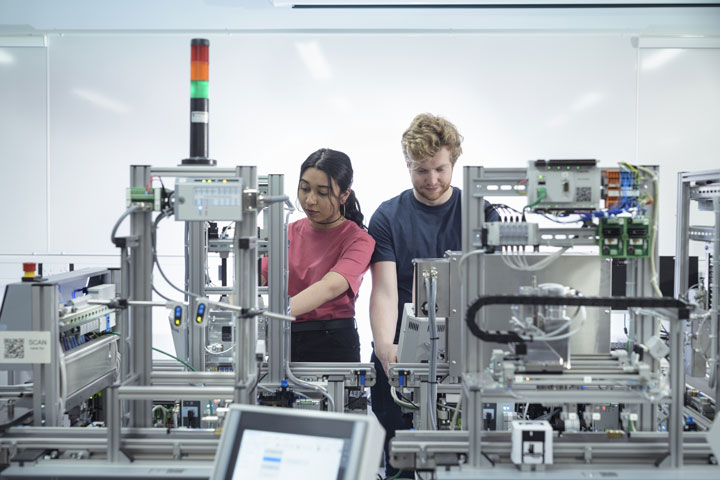Skip to main content
- Go to international homepage
- International Courses
- Diploma of Electronics and Communications Engineering
Back to:International Courses
TAFE NSW Course
International
Course code: UEE50520 | CRICOS Code: 103400E
Diploma of Electronics and Communications Engineering

Overview
About this international course
Unlock a world of possibilities with the Diploma of Electronics and Communications Engineering. Gain practical expertise in cutting-edge technology and prepare for a dynamic career in a rapidly evolving field.
Add to your skillset and learn the valuable operational aspects of the electronics and communications industry as you practise your skills in our industry-standard workshops. These workshops are equipped with electrotechnology software applications and fixed, portable and hand-held tools to give you real world experience.
Outcomes
What you'll gain
Learn new skills
Through a mix of theory and practical coursework, learn to:
- Understand the operating principles of electronic equipment
- Develop software solutions in microcontroller-based systems
- Solve problems in electronic and digital equipment including voice and data communication
- Estimate material and labour costs for electrotechnology projects
- Understand the theoretical aspects of electricity
Gain practical experience
Build your experience and get practical skills in:
- Modifying and commissioning electronic apparatus
- Designing and fault-finding electronic circuits and communications systems
- Commissioning electronics and communications systems
- Implementing and monitoring policies and procedures for environmentally sustainable electrotechnology practices
- Develop and implement data maintenance programs
Develop your professional confidence
Develop the qualities you need to get ahead in this industry:
- Strong attention to detail
- Time management
- Initiative and the ability to self-manage your workload
- Effective communication skills
- Teamwork skills and a collaborative spirit
Career pathways
This qualification could help prepare you for roles like:
- Technical Officer (electronic and communications engineering)
- Telecommunications Technical Officer
Suitability
International entry requirements
At TAFE NSW each course has entry requirements. These help us to make sure that your course choice is right for you and help determine your suitability for a course. We want you to be confident in your decision and successful in your studies.
Entry requirements
Recommended skills and knowledge
Licensing requirements
Fees and locations
Starting dates, course fees and locations
As an international student, you can choose from a range of different courses, offered at various locations. Experience vibrant spaces, libraries, cafes and gyms, as well as places to make friends and socialise with other students.
2026
2027
Additional costs
Additional costs for uniforms, equipment, textbooks and materials (if applicable) range from $300 - $1,000 AUD per course.
Structure and units
What you will study
At the start of your course, you will receive your timetable. You will need to study all core units and a range of additional units.
The requirements for granting this qualification will be met when competency is demonstrated and achieved for: All the core competency standard units defined in the Core Competency Standard Units below and A Combination of Elective competency standard units to achieve a total weighting of 1600 points in accordance with the Elective Competency Standard Units below.
Core units - 7
Core units are the required units that you must complete.
Apply work health and safety regulations, codes and practices in the workplaceUEECD0007
Document and apply measures to control WHS risks associated with electrotechnology workUEECD0016
Implement and monitor energy sector WHS policies and proceduresUEECD0024
Participate in development and follow a personal competency development planUEECD0027
Commission electronics and communications systemsUEEEC0007
ModifyUEEEC0044
Implement and monitor energy sector environmental and sustainable policies and proceduresUEERE0015
Pathways
Continue your studies
At TAFE NSW, you can develop your skills or build your expertise by studying a single course. You can also continue your studies with one of the following pathway options:
Vocational study pathway
Enrol in a range of TAFE NSW courses designed to help you kick-start your career and education goals. You can apply for a Student Visa that will cover the duration of your study.
TAFE NSW degree pathway
From certificates to diplomas, to a TAFE NSW degree, continue your studies with us to help build your success. You can apply for a Student Visa that will cover the duration of your study.
TAFE NSW - university partnership pathways
TAFE NSW has partnerships with a number of Australian universities. These universities offer guaranteed entry and credit transfer to eligible students. How much credit you are eligible for varies depending on the course and university you choose. You can apply for a Student Visa that will cover the duration of your study.
Other university pathways
You may gain entry to another university using your TAFE NSW qualifications. Acceptance and the amount of credit transfer may vary depending on the university and course studies. Check your credit eligibility.
Keep learning with TAFE NSW
Whatever your career ambitions, we will help you get there with a range of courses to develop your skills, build your knowledge and prepare you for work.
TAFE NSW is here to create exceptional learner experiences and to support you on your study journey to make sure you achieve your goals.
Explore your study options across a range of disciplines and talk to your TAFE NSW Education Agent or contact us
Services
Campus facilities and support services
TAFE NSW provides support services across all campus locations. Whatever your needs or circumstances, we have the resources, counselling and facilities to support you while you are studying.
You’ll also have access to classrooms equipped to deliver electrotechnology content. This includes electrotechnology software applications, fixed, portable and hand-held tools, equipment and suitable materials storage facilities, so you can practise your skills.
We offer a range of support services including:
- TAFE NSW Disability Support Service
- TAFE NSW Language, Literacy, and Numeracy (LLN) support
- TAFE NSW Careers, Counselling, and Pathways Service
- Smarthinking – online access to a tutor
- LinkedIn Learning – an online resource that offers innovative courses and tutorials to improve your personal and professional skills
We're here to help
If you have more questions about your course choice or study plans contact us today.
Contact TAFE NSW International